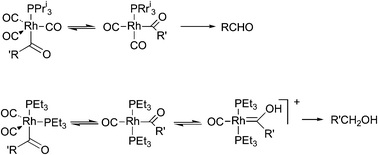The origin of chemoselectivity in the hydrocarbonylation of alkenes catalysed by trialkylphosphine complexes of rhodium†
Abstract
The formation of monophosphine

* Corresponding authors
a
School of Chemistry, University of St. Andrews, St. Andrews, Fife, Scotland, UK
E-mail:
djc@st-and.ac.uk
Fax: 44-1334-463808
Tel: 44-1334-463805
b
Lyondell Chemical Company, 3801 West Chester Pike, Newtown Square, PA, USA
E-mail:
Daniel.White@lyondell.com
Fax: 1-610-359-4866
Tel: 1-610-359-2064
The formation of monophosphine

 Please wait while we load your content...
Something went wrong. Try again?
Please wait while we load your content...
Something went wrong. Try again?
P. Cheliatsidou, D. F. S. White and D. J. Cole-Hamilton, Dalton Trans., 2004, 3425 DOI: 10.1039/B412919A
To request permission to reproduce material from this article, please go to the Copyright Clearance Center request page.
If you are an author contributing to an RSC publication, you do not need to request permission provided correct acknowledgement is given.
If you are the author of this article, you do not need to request permission to reproduce figures and diagrams provided correct acknowledgement is given. If you want to reproduce the whole article in a third-party publication (excluding your thesis/dissertation for which permission is not required) please go to the Copyright Clearance Center request page.
Read more about how to correctly acknowledge RSC content.
 Fetching data from CrossRef.
Fetching data from CrossRef.
This may take some time to load.
Loading related content
